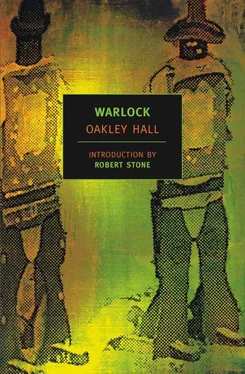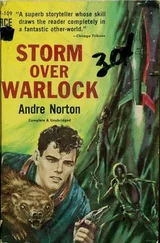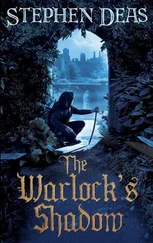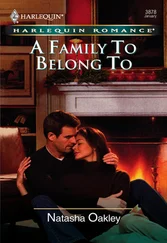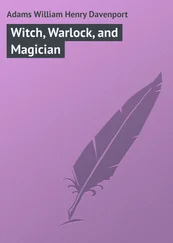“Now what do you suppose they are up to?”
“Couldn’t guess,” Murch said.
“Well, if I were you I would get on back to town quick where everybody could see me. In case the Bright’s City stage runs into trouble. You wouldn’t want to get taken for a road agent.”
“No,” Murch said, and spat.
“Let me have the Winchester.”
Murch drew it from the saddle boot and handed it to him, mounted, and started back along the stage road at a fast trot. He looked like a gallon jug in the saddle.
Morgan walked back to his horse, remounted, and, leaving the stage road, headed east to meet the lower slopes of the Bucksaws. He crossed the first ridge and swung downhill in the barren canyon behind it. To his right now was the upper end of the rock outcrop that slanted like the edge of a long, curved knife to the valley floor.
He tied his horse in a mesquite thicket, removed his suit, and in jeans and the canvas jacket, a bandanna tied around his neck and Winchester in hand, scrambled up the ridge. Just on the other side of it, hidden by the crest, he began to work his way down.
Once he stopped to rest, breathing deeply of the clear air, and looked about him. He could see the valley for many miles east from here, with the cloud shadows moving across it. He could make out the cut of the stage road through the low brush for a long distance too. He felt a growing excitement. He accepted it with reluctance at first, cynically, but more and more fully as he made his way on down the ridge. He chuckled to himself from time to time, and paused more often to breath great sucks of the sweet air and gaze out on the colors of the valley. His senses felt alive, as they had not for a long time; he felt unburdened, young, and larking, but still the dark cynicism in himself kept careful watch, nagging and sneering at him. Once, as he edged his way around a steep rock, he whispered, “Well, Clay, I have never crawled on my belly for any other man.”
Finally he heard the sound of voices, and he crawled to the crest of the ridge, where, hidden between two rocks, he could look down to the west side. The stage road cut in close to the ridge below him, swung to the right through a narrow defile, and angled to the left again. He could see the two of them not fifty yards away.
They were sitting on a low ledge just beyond the defile, which was called Road Agent Rock — it was said that so many stages had been stopped there that Buck Slavin had had to send out a crew to fill the rut made by the dropping strongboxes. They were in the full sun and Pony had his hat off and was mopping his face with a blue bandanna. Their horses weren’t in sight.
“Just like the bitching coach to run late today,” one of them said. The words came to him clearly. He edged the Winchester up beside him, and rested his cheek against the warm stock.
From time to time Calhoun would move into the defile to gaze east along the stage road. Then Benner, a head shorter, would go. They muttered back and forth. Once they both went out together. They sat and quarreled in the sun. Then Calhoun went out to look for the stage.
“Here it comes!” he cried, and ran back. They both tied neckerchiefs over their faces and jammed their hats down to their ears. They arranged themselves on either side of the stage road just beyond the cleft in the rock, facing each other tense and motionless like firedogs of unequal size.
Morgan glanced back to see the dust the stage was raising; it would be ten minutes yet. He watched an ant edging its way along the perpendicular side of one of the rocks that concealed him. It was carrying something white many times its own size. He watched the ant struggling; often it almost fell, but it never let go of its burden.
He whispered to it, “When you get home you’ll find it wasn’t worth the trouble, you damned fool!”
At last he heard the stage, the squeal of wheels, the whip crack and shout from the driver. It occurred to him suddenly that Kate was there, not a hundred yards away. He heard a steel rim scrape on rock. The lead team came into his field of vision, then the coach itself, Foss holding the reins with a boot up on the brake, Hutchinson, the messenger, with one hand braced behind him for balance and the shotgun ready in the other, leaning forward to try to see around the bend.
“Pull up and reach!” Calhoun bellowed, and fired into the air. Pony leaped out before the leaders, who bucked and plunged sideways. Hutchinson half rose as Pony ran around toward him, a six-shooter in either hand; Calhoun laid the Winchester on Foss.
“Throw it down, God damn you!” Pony shrilled, and Hutchinson pitched the shotgun away from him.
“Box down!” Calhoun said.
Foss had his hands raised shoulder-high, his foot on the brake, his eyes squinted against the sun. Hutchinson dragged the strongbox out. Morgan heard him grunt as he lifted and dropped it at Calhoun’s feet.
“Let’s see what the passengers got,” Calhoun said. He flung the door open, and jumped back with his rifle leveled. Pony dragged the box away from the coach.
Morgan eased his own Winchester forward a little and grimaced as the sun caught fire along the barrel. He framed the door of the coach in the cleft of the rear sight, and gently raised the front sight blade beneath it. The blade danced, suddenly, as he saw Kate’s face sharply outlined in the window. A man in a black hat squeezed out the door and dropped lightly to the ground, raising his hands.
Morgan stared at the man’s face down his sights. It was a Cletus clearly enough, a tougher, meaner, harder version of Bob Cletus; he felt a weakening run through him and tensed his body against it as though he were clenching a fist. He lowered the sights to the man’s shirt front. Kate appeared, a white hand on the door frame, her head bent down so that her hat hid her face.
He stroked the trigger. The rifle jarred in his hands; the coach was obscured in smoke. Ragged and shrill through the crash of the Winchester came the scream, and through the smoke he saw Cletus pitch forward with his broad-brimmed hat rolling free like a cartwheel. A Colt fell from his outstretched hand. Kate jerked back inside the coach. One of the leaders bucked up, hoofs boxing the air, and there was a chorus of yells. Then suddenly the coach was moving, and Foss was thrown back hard upon the seat. Hutchinson ducked down and turned, and, a Colt appearing in his hand, fired at Pony — smoke drifting from the muzzle an instant before the sound of the report. Calhoun raised his rifle and fired, levered and fired again, and Hutchinson slumped. Now Foss was standing and his long whip cracked out alongside the leaders. The stage fled, the door slamming open and shut and Kate’s face showing once again in the window as the coach ran out of Morgan’s view, with a loose tarpaulin flapping over the boot.
Calhoun fired again, and then he and Benner stood gazing after the coach. Presently Pony went over to where Cletus lay, and, thrusting at his shoulder with a boot, turned him on his back. Neither of them glanced up to where Morgan lay hidden. They bickered over Cletus’s body for a while, went through his pockets, and then Pony went out of sight at a run. He reappeared, leading the horses. In a flurry of activity they raised and lashed the strongbox to the saddle of one, mounted, and started down the valley at speed.
Morgan sighed. The sun felt very warm on his back; his face was wet. He rose, stretched, untied the bandanna and wiped his face with it, staring down at the body sprawled on the ground below him, boots twisted together, arms outstretched and the glisten of red on the white shirt front. He felt the excitement slipping away.
He leaned on one of the rocks that had concealed him, and watched the high, tan plume run down the valley. Now he could also see the coach rolling slowly up the long grade toward the rim — the driver still standing and his whip arm working mechanically. Then he looked down at the dead man again. He wondered where Kate had had to go to find him.
Читать дальше
